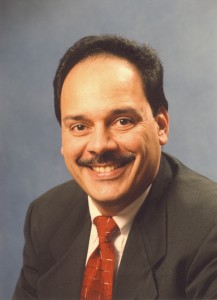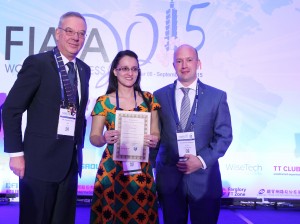The global freight transport insurer is encouraging supply chain stakeholders to understand better the interrelationship of the various functions in the intermodal network, particularly in the United States where one effect of the enlarged Panama Canal will be to increase importers’ routing options in order to supply internal markets
New Jersey, 12 November, 2015

Dan Negron
Speaking at the recent TOC Americas Conference in Panama, TT Club’s Senior Underwriter Dan Negron outlined the future opportunities to diversify both the export and import supply chains in the US as the widening of the Panama Canal (due to become operational early next year) will allow larger container ships to transit from Asia to Gulf and Atlantic Coast ports.
Explaining how freight transport and logistics operators are adapting to provide increasingly efficient and economic options to shippers, Negron said, “Stakeholders are beginning to understand the complex relationships of functions within the intermodal system. Some have diversified to become multi-functional participants in the system. However, whether operators choose to act independently or to diversify in this way, all need to ensure that they engage in best practices to avoid systems failures and delays.”
Additionally Negron pointed out the need to consider potential congestion at pinch-points beyond the ports of entry as the domestic transport process to deliver goods is adapted to changes in routings to and from internal markets. The West Coast dominant intermodal network that has previously prevailed in serving Asian imports has had well documented congestion problems and care must be taken in avoiding similar failings as other alternative routes develop.
Negron put forward a number of operational guidelines in which the employment of best practice will particularly safeguard the integrity of the network. “While effective communications between participants along the distribution chain seems an obvious requirement it should be emphasised,” said Negron. “An understanding of the legal environment in which operational functions take place, including standard trading conditions and the contractual obligations of the various partners is also vital.”
The complexity of the supply chain may be typified by the various modal options available (road, rail and inland river/waterway in particular), each with differing logistical and contractual requirements. Thorough understanding of the multimodal facets of the evolving system is required, together with greater investment in training to raise skill levels. This depth of understanding must encompass the appreciation of seamless insurance cover that ensures protection against mishap within each stage of complex transport arrangements.
– End –
Notes to Editors
TT Club
The TT Club is the international transport and logistics industry’s leading provider of insurance and related risk management services. As a mutual insurer, the TT Club exists to provide its policyholders with benefits, which include specialist underwriting expertise, a world-wide office network providing claims management services, and first class risk management and loss prevention advice.
Customers include some of the world’s largest shipping lines, busiest ports, biggest freight forwarders and cargo handling terminals, to companies operating on a smaller scale but whose operations face similar risks. TT Club specialises in the insurance of Intermodal Operators, NVOCs, Freight Forwarders, Logistics Operators, Marine Terminals, Stevedores, Port Authorities and Ship Operators.
The TT Club is managed by Thomas Miller.
Thomas Miller is an independent and international provider of insurance, professional and investment services. Founded in 1885, Thomas Miller’s origins are in the provision of management services to mutual organisations, particularly in the international transport and professional indemnity sectors; where today they manage a large percentage of the foremost insurance mutuals. Thomas Miller also manages insurance facilities for all the self-employed barristers in England & Wales, as well as trustees of pension schemes, patent agents and housing associations.
Principal activities include:
- Management services for transport and professional indemnity insurance mutuals
- Investment management for institutions and private clients
- Professional services
- Building defects insurance







 Charles Fenton, Chief Executive of the TT Club, said: “the Club has had a good, stable first eight months of the year in spite of the on-going challenging insurance market conditions and a return to more normal levels of large claims than experienced in 2013 and 2014.”
Charles Fenton, Chief Executive of the TT Club, said: “the Club has had a good, stable first eight months of the year in spite of the on-going challenging insurance market conditions and a return to more normal levels of large claims than experienced in 2013 and 2014.”


